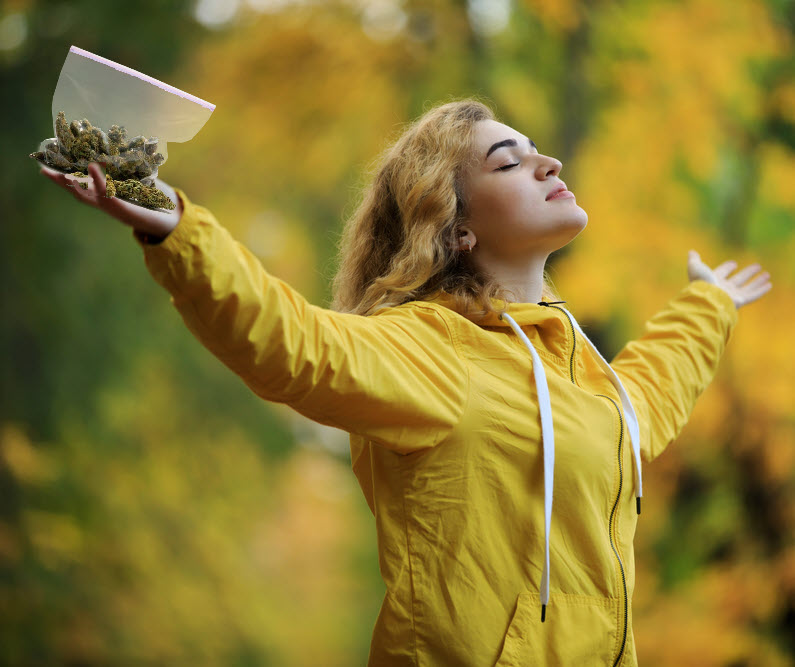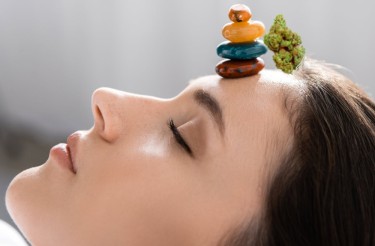Cannabis News
Cannabis Has Sparked a Spiritual Revolution in Modern Day Religions, But How Does the Story End?
Published
2 months agoon
By
admin

Cannabis and the dawn of the Spiritual Revolution
In the intricate tapestry of human existence, our beings are orchestrated by an elaborate symphony of thought-structures. These structures, much like sophisticated software, run the gamut of our physical and emotional selves, dictating our interactions, reactions, and even our beliefs. At the heart of these systems lie religions—complex, deeply ingrained programs that significantly shape the course of human history and individual lives. They serve as the blueprint for moral conduct, societal norms, and even dietary habits, illustrating the profound influence of religious belief on daily life. For instance, dietary laws in Judaism and Islam lead adherents to eschew pork, while many Christians partake freely, integrating such practices into their expressions of faith.
Far from the vilification it sometimes receives, religion has been a cornerstone of civilization’s progress. It has not only molded societal norms but also fostered advancements in science, cartography, and historiography. The monasteries of the Middle Ages, for example, were not just spiritual sanctuaries but beacons of learning and knowledge preservation, playing a crucial role in the survival and dissemination of classical wisdom. In this light, religion emerges not as a relic of bygone eras but as a dynamic force that has, for better or worse, propelled humanity forward.
Yet, the static nature of religious doctrines often finds itself at odds with the rapidly evolving tapestry of modern life, leading to conflicts that challenge the adaptability of age-old beliefs. This tension between tradition and progress brings us to a question that has sparked considerable debate in contemporary discourse, a question posed by a curious mind on Reddit: “Can Christians use cannabis?”
This article delves into the heart of this query, exploring the intersections of faith, morality, and the use of a plant that has been both vilified and revered throughout history. By examining biblical quotes and the theological rationale behind the prohibition and acceptance of substances, we aim to shed light on the compatibility of cannabis use with Christian doctrine. Furthermore, we will explore how, beyond mere permissibility, cannabis can serve as a tool for spiritual exploration, offering a pathway to deeper understanding and connection with the divine.
In the rich tapestry of the world’s flora, cannabis holds a unique position, deeply intertwined with humanity’s spiritual and cultural heritage. Rooted in the divine act of creation, as chronicled in the Book of Genesis, cannabis emerges not merely as a plant but as a divine provision, imbued with profound spiritual significance. This sacred narrative is further illuminated by the plant’s role in the holy anointing oils of ancient times, a practice that sanctified kings and messiahs, infusing their beings with the essence of the divine through the skin, in what can only be described as a “heroic dose” of spiritual awakening.
This ancient ritual underscores a truth long understood yet seldom acknowledged: cannabis’s capacity to transcend the ordinary, to elevate the mind and spirit beyond the confines of conventional consciousness, facilitating a communion with the divine that transcends the limitations of the material world. It is a reminder that before the veil of prohibition was cast over cannabis in 1937, this plant served humanity in myriad ways, from medicinal applications to the crafting of textiles and ropes—a testament to its integral role in the fabric of human civilization.
The advent of prohibition, driven by a maelicous concoction of deceit and ulterior motives aimed at market monopolization and the erosion of personal freedoms, marks a departure from this harmonious relationship. This historical aberration begs the question: why would a benevolent Creator bestow upon humanity a plant that so perfectly complements the intricacies of the human body, only to then forbid its use? The exploration of endocannabinoids and phytocannabinoids reveals a biological synergy, a lock-and-key mechanism where THC mirrors the compounds our bodies naturally produce, underscoring the plant’s intrinsic alignment with human physiology.
Yet, the prevailing narrative, shaped by decades of societal programming and the demonization of cannabis, has led many to perceive its use as a transgression against divine will. This misconception is a tragic consequence of conflating man-made laws with spiritual truths, resulting in a profound dissonance between belief and reality. The crux of the matter lies not in the act of consuming cannabis, but in the alignment of one’s actions with the convictions of the heart. To consume cannabis in defiance of one’s own beliefs is to sin, not because of the plant itself, but due to a betrayal of one’s own spiritual integrity.
This presents a conundrum, for if one’s heart deems cannabis consumption as wrong, based solely on inherited biases and unfounded fears, does adherence to this belief not constitute a sin of ignorance? The challenge, then, is to discern truth from falsehood, to question the validity of beliefs forged in the crucible of prohibitionist propaganda.
Cannabis, like any of nature’s gifts, is not universally suited for all, mirroring the idiosyncratic nature of human biology where, akin to peanuts, it may nourish some while harming others. Yet, when approached with mindfulness and reverence, cannabis offers an opportunity for profound spiritual exploration. By engaging in a direct dialogue with the Divine, one may seek guidance on the conscious use of cannabis, not as a means of indulgence, but as a tool for spiritual enrichment, asking, “Am I able to use cannabis consciously and still glorify You?”
The answers to such inquiries are as diverse as the individuals who seek them, for the relationship between the Creator and creation is deeply personal, transcending the realm of absolutes. Nevertheless, the essence of cannabis, when stripped of societal prejudices and embraced in its purest form, is neither malevolent nor baneful. Unlike alcohol, which often dulls the senses and ensnares the spirit, cannabis serves as a catalyst for mental expansion, a sacred instrument fashioned by the Divine for the purpose of enlightenment and introspection.
To fully embrace the spiritual potential of cannabis requires a liberation from the shackles of conventional religious dogma, an awakening to the limitless expressions of the infinite Spirit. This journey of discovery is not without its challenges, for it demands courage to confront and transcend the deeply ingrained misconceptions that have long obscured the truth of this divine gift.
Therefore, let not fear nor the specter of sin deter you from pursuing the path of spiritual inquiry. The journey of each soul is preordained, marked by a divine blueprint that invites exploration and growth. To acquiesce blindly to the doctrines imposed by others is to forfeit one’s divine inheritance, the freedom to seek and embrace the manifold manifestations of the Divine.
The question of whether Christians can use cannabis is not merely a matter of doctrinal debate but a profound inquiry into the nature of divinity, freedom, and the sacred bond between the Creator and creation. As we navigate this complex terrain, let us do so with open hearts and minds, guided by the light of understanding and the unwavering belief in the benevolence of the Divine plan. For in the realm of spirituality, as in all aspects of creation, there exists an infinite diversity of paths, each leading to the same eternal truth, the boundless love of the Creator for all beings.
As humanity strides into the Age of Aquarius, leaving behind the bygone Age of Pisces, we stand at the precipice of a monumental transformation not just in the realm of technology and innovation, but equally in the spiritual and religious dimensions of our existence. The Age of Pisces, characterized by its dualistic nature, rigid dogmas, and structured religions, is gradually yielding to the fluid, expansive consciousness of the Aquarian era. This new epoch heralds an era where artificial intelligence can articulate thoughts, robots undertake laborious tasks, and humanity possesses the unparalleled freedom to explore the depths of its desires and capabilities. If you’re immediately dismissive of the ideas of “Ages” as mentioned above, continue reading as if it is a metaphor.
Intriguingly, as we navigate this transition, there is a resurgence of interest in psychedelics and an embrace of cannabis, substances once relegated to the fringes of society now re-emerging as catalysts for spiritual awakening and exploration. These ancient plant medicines, revered for their mind-expanding properties, are being reintegrated into modern spirituality, suggesting a collective yearning to transcend the limitations of previous paradigms and embrace a more fluid and inclusive understanding of the divine.
The renaissance of psychedelics and the mainstream acceptance of cannabis signal a shift towards a spirituality that values direct, personal encounters with the transcendent, unmediated by the hierarchical structures that characterized the religions of the Piscean age. This evolution reflects a broader societal movement towards decentralization and individual autonomy, mirroring the technological advancements that empower individuals to create, learn, and explore with unprecedented freedom.
As we venture deeper into the Aquarian age, it is likely that we will witness the emergence of new spiritual movements that draw on the wisdom of ancient traditions while incorporating the insights afforded by modern science and technology. These “Pisces religions,” infused with new flavors and perspectives, will not disappear but will transform, becoming more adaptable and open to the diverse experiences and understandings of the divine.
The integration of psychedelics and cannabis into spiritual practice is indicative of a broader trend towards embracing states of consciousness that enable individuals to break free from the dualistic thinking of the past. This spiritual flexibility allows for a more nuanced, non-binary approach to understanding the nature of reality and our place within it. The new spirituality of the Aquarian age is characterized by its emphasis on direct, experiential knowledge of the divine, encouraging individuals to explore their unique paths to enlightenment and connection with the source.
This era of spiritual exploration and discovery may not give rise to mainstream religions as we have known them. Instead, it is poised to foster a diverse tapestry of spiritual expressions, each reflecting the individual’s journey towards understanding and unity with the cosmos. The rigidity and dogmatism of the past are giving way to a more open, inclusive, and personal approach to spirituality, where the connection between the individual and the divine is defined not by doctrine or tradition, but by the seeker’s own experiences and insights.
In conclusion, as we embrace the dawn of this new spiritual age, we are called to explore the vast landscapes of consciousness opened up by both ancient plant medicines and cutting-edge technologies. This journey towards a more personal and flexible spirituality is not a rejection of the past but an evolution, a synthesis of the wisdom of ages with the possibilities of the future, inviting us to reimagine our relationship with the divine in the boundless expanse of the Age of Aquarius.
CANNABIS SPIRITUALITY, WHAT IS IT, READ ON…
EVERYONE IS SPIRITUAL, NO ON IS RELIGIOUS, THE RISE OF CANNABIS!
You may like
-


The 3 Biggest Winners from Rescheduling Cannabis?
-


Is Your Kid Smoking or Vaping Weed?
-


Press Release: PsychedelicNewsWire Named Official Media Sponsor of the 4th Annual Psychedelic Therapeutics and Drug Development Conference
-


Memorial Day’s best weed, prerolls, carts, and more 2024
-


Naps Done Right Can Make a Huge Difference
-


Michigan is selling more cannabis, but retailers are taking in less money
Cannabis News
The 3 Biggest Winners from Rescheduling Cannabis?
Published
11 mins agoon
May 20, 2024By
admin

President Joe Biden’s support of the administration’s decision to reschedule cannabis from Schedule I to Schedule III is likely to result in considerable financial benefits for large, legal cannabis businesses and the illicit market. This action may lessen the restrictions imposed by IRS tax regulation 280E, which has banned cannabis businesses from deducting standard business expenditures. Which cannabis firms will gain the most from this change?
The illicit market will get a huge boost by removing the punshiments associated with getting caught dealing or transporting a Schedule 1 drug. Now that the fines, prison sentences, and desire to enforce Schedule 3 crimes is lessened, look for the illicit market to boom across America. It is estimated that the illegal cannabis market is 3x the size of the legal US market as of 2024, so look for that multiple to expand if Schedule 3 is enacted. Removing a negative incentive in economics always leads to predictable action.
In the legal market, the largest MSOS, or those that paid the most taxes, have the most to gain by a repeal of the 280E tax code and future tax credit or refunds coming their way
Industry Leaders in Tax Payments
Rescheduling cannabis will abolish the onerous 280E tax law, potentially freeing up more than a billion dollars in tax savings for the business. Curaleaf (OTC: CURLF) and Trulieve (OTC: TCNNF), both of which make considerable tax payments, are among the firms most likely to profit. Repealing 280E limits would allow these businesses to deduct typical business costs, greatly improving their financial situation.
Truelive alone stands to get $113,000,000 in tax refunds and savings!
Senior analyst Pablo Zuanic of Zuanic & Associates believes that these tax reductions may result in improved cash flows, allowing these businesses to reinvest in development and growth. In the quickly changing cannabis market, having this kind of financial flexibility is essential for keeping a competitive advantage and encouraging creativity.
Zuanic has consistently highlighted the disparity between current market valuations and the potential upside, particularly if federal legalization occurs. He emphasizes that immediate cash flow improvements could lead to substantial revaluation of these companies. By enabling the deduction of ordinary business expenses, the financial statements of these companies would more accurately reflect their true profitability, attracting more investors and boosting market confidence.
The potential tax savings are a temporary relief and a game-changer for the industry. Analysts believe that the improved cash flow could result in substantial revaluations of cannabis companies. For Curaleaf and Trulieve, this change would mean their financial statements would better represent their actual profitability, leading to increased investments and further expansion opportunities.
Curaleaf’s Financial Outlook
Beacon Securities’ Russell Stanley sheds light on Curaleaf’s financial landscape, highlighting the company’s adept management of operating cash flow. This proficiency facilitated a successful debt repurchase post-quarter, significantly enhancing its financial stability. With the anticipated rescheduling of cannabis and the potential enactment of the SAFER Banking Act, Curaleaf stands to benefit from a transformed financial environment, potentially witnessing a substantial surge in its operating cash flow by up to 92% and free cash flow by 188%.
Wedbush Securities recently released a report on Curaleaf, elevating the stock’s 12-month price target from $6.00 to $7.00 while maintaining a buy recommendation. The report underscores Curaleaf’s commendable performance in key domestic markets like Connecticut, Arizona, Maryland, and New York. Projections indicate a revenue uptick to $1.50 billion by 2025, coupled with improvements in overall profitability. This optimistic forecast reflects the company’s robust financial position and its strategic market presence.
Proactive debt management techniques and well-thought-out market positioning highlight Curaleaf’s potential for long-term development and financial success in the changing cannabis industry. Curaleaf is in a strong position to benefit from the rescheduling of banking and cannabis legislation, which may lower regulatory obstacles and further establish the company’s leadership in the cannabis market.
Unlocking Trulieve’s Growth Potential
Trulieve’s Growth Trajectory
Trulieve’s growth trajectory is drawing attention, particularly from Needham’s Matt McGinley, who emphasizes the company’s operational efficiency. McGinley points out that Trulieve has achieved its highest gross margin and EBITDA rates observed in over two years, indicating strong operational performance. This efficiency positions Trulieve favorably for capitalizing on emerging opportunities in the cannabis market.
Key legislative advancements in pivotal markets such as Florida and Pennsylvania present significant growth potential for Trulieve. As these markets potentially transition to adult-use cannabis, Trulieve stands to benefit from increased demand and expanded market reach. Leveraging its operational efficiency and established market presence, Trulieve is poised to capitalize on these legislative shifts to drive revenue growth and enhance shareholder value.
Trulieve is positioned to be a major participant in the growth of the cannabis sector due to its strategic focus on operational excellence and its flexibility in responding to changing regulatory environments. Trulieve is in an excellent position to maintain its growth trajectory and establish itself as a top cannabis supplier, thanks to encouraging legislative changes and a proven track record of high performance.
Analysts’ Industry Impact Assessment
Viridian Capital Advisors offers insights into the industry impact, noting that ten MSOs exceeded EBITDA estimates by $37 million in the first quarter of 2024. This performance suggests that initial projections may have been conservative, indicating a positive trend for cannabis companies. Analysts from Viridian specifically highlight Curaleaf and Trulieve, among others, as poised to benefit from the financial changes resulting from the removal of 280E tax restrictions.
The long-term outlook for the cannabis industry remains bullish, with potential federal legalization driving substantial valuation growth. Pablo Zuanic from Zuanic & Associates suggests that the US market alone could justify over $110 billion in valuations by 2030 assuming federal legalization. The removal of tax restrictions would directly impact bottom lines, potentially leading to significant valuation increases for many cannabis stocks.
All things considered, the possible repeal of the 280E tax laws offers cannabis businesses a big chance to improve their financial standing and market value. As analysts speculate that early projections may have overestimated the sector’s potential, businesses like Curaleaf and Trulieve might gain from more cash flow and better profitability, setting them up for long-term success in the changing cannabis market environment.
Bottom Line
The impending rescheduling of cannabis and the potential repeal of IRS tax regulation 280E offer a substantial opportunity for cannabis companies to strengthen their financial positions and market appeal. Industry leaders such as Curaleaf and Trulieve stand to benefit significantly, with projected increases in cash flow and profitability paving the way for sustained growth. Analysts anticipate a positive market response, with potential valuation growth and a bullish outlook for the long-term trajectory of the cannabis industry. These regulatory changes mark a pivotal moment, allowing businesses to capitalize on newfound financial flexibility and attract investor confidence. As the sector continues to evolve, Curaleaf, Trulieve, and other key players are positioned to thrive, driving innovation and shaping the future of the cannabis market.
WINNERS AND LOSERS FROM SCHEDULE 3, READ ON…


Marijuana for recreational and medicinal purposes is becoming more widely available and simpler to purchase every day. Furthermore, opinions about the drug’s possible risks have changed as a result of recent legislative modifications, especially among young teenagers.
While proper use of marijuana can offer health benefits for specific conditions, inappropriate use can lead to a variety of problems. It can severely impact health, situational judgment, memory, coordination, and more.
Given that marijuana has rapidly become a much more commonly used drug among young people, it is crucial to recognize the main signs of marijuana use in teens to ensure their safety and well-being.
Statistics on Child Marijuana Use
Though the stats may surprise you, marijuana is the most often used narcotic among teenagers. Among children between the ages of 12 and 17, the National Center for Drug Abuse reports that:
– Nearly 44% have tried marijuana in their lifetime, up from 37% in 2019.
– 35% used marijuana in the past year.
– Almost 7% of 12th graders use marijuana daily.
Regretfully, eighth, ninth, and tenth kids are exposed to an alarmingly high level of marijuana. Early usage is problematic since those who start using earlier have a greater likelihood of heavier use later in life.
How THC Impacts the Brain
The active element in cannabis is tetrahydrocannabinol (THC), which produces the “high” associated with marijuana. THC can be ingested by smoking cannabis flowers, vaping concentrated forms, or eating THC-infused foods. THC impacts the brain by interfering with processes that are typically controlled by naturally existing endocannabinoids.
The brain grows from birth to the mid-twenties, and consuming marijuana at a young age can interrupt this important development. Early marijuana usage appears to influence brain development, according to recent research.
The effects of cannabis on the brain are extensive:
– Executive Functioning: Skills necessary for daily life, such as focus, memory, problem-solving, planning, reasoning, and emotional control, are compromised.
– Working Memory: The ability to remember and later recall or use information is reduced.
– Lingering Effects: The impact of cannabis use can last well beyond the period of intoxication. Even if someone smokes on a weekend, the effects can persist into the following week. Regular use leads to a persistent decline in executive functioning, working memory, and other cognitive areas.
Cannabis use interferes with the brain’s circuits, and it remains uncertain whether the brain can fully recover if marijuana use is discontinued.
Signs Your Child is Using Cannabis
Recognizing if your child is using marijuana can involve noticing various signs, including:
– Hair or clothes with a pungent marijuana smell
– Red or bloodshot eyes
– Delayed reaction times
– Mood swings
– Laziness and tiredness
– Presence of marijuana-related paraphernalia
– Paranoia or anxiousness
– Increased hunger or “munchies”
Visible Signs of Marijuana Use
Shortly after usage, marijuana’s effects can be perceived both visually and aromatically. It is very suggestive of marijuana usage if your adolescent returns home with red or bloodshot eyes. Physical and mental delays in response times and problems with muscular coordination are further symptoms.
Cannabis has a unique fragrance that is another warning clue; it is frequently characterized as having a pungent, musky smell like that of a skunk. On your teen’s clothes, this odor might cling rather readily.
Changes in Emotional State
The body and mind might react differently to different strains or varieties of marijuana. Teenage marijuana usage is frequently indicated by mood swings, lethargy, and general exhaustion in their day-to-day demeanor. Depending on how their body responds, they might also seem nervous and exhibit an elevated heart rate.
Your youngster may struggle to focus at job, school, or home as a result of these changes, which frequently results in subpar performance and grades. This decrease might be a clear indication that marijuana use has turned into an addiction.
Educating Your Child about Marijuana
Regardless of whether you suspect your child is using cannabis, it’s important to discuss it. Parents and caregivers should talk about all types of dangerous substances, including nicotine, alcohol, and cannabis, with children as early as elementary school.
It’s important to be proactive and talk to your youngster about the risks associated with marijuana. These talks may serve to deter marijuana usage or at the very least postpone the initial experience until the mid-20s, when the brain is more completely matured.
As teenagers become older, their need for independence grows, which makes it harder for parents to control their actions. Still, parents need to persevere. It is significantly more dangerous to consume cannabis than it is uncomfortable to have a difficult talk.
Addressing Marijuana Use and Seeking Help
For teenagers’ wellbeing, it is essential to identify and treat marijuana usage. It’s crucial to handle the matter with compassion and support if you think your child may be consuming marijuana. Discussing its usage, the rationale behind it, and any possible hazards should come first in an honest and nonjudgmental discussion. Give your child access to a secure environment where they may talk about their thoughts and experiences. You can gain insight into their viewpoint and advice on how to make better decisions by having this discussion.
If using marijuana has become troublesome, you might think about getting professional assistance. Resources like therapists, counselors, and specialty treatment programs can provide your kid with the help they need. These specialists are qualified to deal with underlying problems including stress, peer pressure, or mental health disorders that may be causing drug use. Early intervention can stop the usage from getting worse and support your kid in creating healthy coping mechanisms. Getting a medical expert involved can also offer a methodical way to handle the matter and guarantee that your adolescent gets the treatment they need.
It is critical to be involved and supportive throughout the process. Encourage your kid to participate in activities that support their well-being and offer positive reinforcement for good habits. Stay educated about the services available in your area, and consider joining support groups for parents struggling with similar challenges. You can assist your child in navigating this difficult period and promote a healthy, drug-free future by keeping open communication and obtaining expert support as required.
Bottom Line
Parents need to be vigilant about the signs of marijuana use in their children, given its prevalence among teenagers and its potential impact on their health and development. Early detection, open communication, and seeking professional help if needed are key strategies for addressing marijuana use in adolescents. By providing support, education, and access to resources, parents can help guide their children towards healthier choices and a drug-free future.
HOW TO HAVE “THE TALK” WITH YOUR KIDS, READ ON..
Cannabis News
How Did Hidden Leaf Cannabis Become the Leader of the Ontario Marijuana Market?
Published
3 days agoon
May 17, 2024By
admin

Cannabis.net sat down with Ontario’s hottest cannabis store to find out some of their “secret sauce” that made them the best dispensary in Ontario, Canada.
Q: How did you come up with the name Hidden Leaf for Ontario’s premier cannabis dispensaries?
A: Growing up, I was always a big fan of the anime show Naruto, where the main character grew up in a village called “Hidden Leaf Village.” Naruto’s backstory really resonated with me, inspiring me to name the company Hidden Leaf. As Ontario’s premier Burlington and Scarborough Dispensary, we strive to embody the spirit of community and resilience found in Naruto’s tale.
Q: What makes Hidden Leaf the best dispensary in Scarborough or Burlington?
A: At Hidden Leaf, customer service sets us apart. Unlike many other dispensaries that curate their menu based on profitability, our customers drive our selection. We actively encourage our patrons from both our cannabis store Scarborough and cannabis store Burlington to send in their product recommendations, which we try our best to stock. Plus, we offer the most competitive pricing, making cannabis affordable for everyone. Our commitment to these principles makes us stand out in the Scarborough dispensary and Burlington dispensary markets.
Q: How did you first get into the Canadian cannabis market? What made you take the leap of faith?
A: From a young age, I’ve always wanted to own a business and had a passion for the cannabis industry, learning to grow plants and understanding the different types of concentrates. Taking the risk to enter the business felt right as it was a great way to expand my knowledge and participate actively in the burgeoning cannabis market in cities like Scarborough and Burlington.
Q: Canada was the first G7 country to legalize weed, what advice would you look back and give your past self? What do you wish you knew then that you know now?
A: Looking back, I wish I had learned more about the cannabis business earlier and entered the industry as soon as it was legalized. Now, understanding the different avenues to enter the cannabis industry, I would definitely consider owning my own grow facility among other ventures. This knowledge would have been invaluable from the start, especially in dynamic markets like those of our Cannabis Store Burlington and other locations.
Q: What are Hidden Leaf’s best strains, or what do customers come back for over and over?
A: Hidden Leaf carries a wide variety of brands and strains to cater to every customer’s needs. From budget-friendly options for those looking to save a few bucks to premium quality strains for the real cannabis connoisseurs, our selection is vast. Customers frequently return for our consistent quality and the breadth of our offerings, including popular cannabis flowers at both our Scarborough and Burlington locations.
Q: What has been the biggest challenges in setting up a cannabis business in Canada?
A: The biggest challenge has been finding the right location. Despite legalization, there’s still a stigma around cannabis with many landlords, making it hard to lease properties for cannabis businesses. Additionally, the market is quite saturated with many retailers opening up, so it’s crucial to choose strategic locations for our dispensaries to avoid excessive competition, particularly in areas served by our Scarborough dispensary and cannabis store Burlington.
Q: What do you think about the future of cannabis beverages?
A: The future of cannabis beverages and edibles is very promising. Many people who are new to cannabis are not fans of smoking, so THC beverages and edibles offer a fantastic alternative. These products are expected to attract a new wave of consumers looking to explore cannabis in a more familiar and accessible form.
Q: What is the best way for people to find out more about us or visit us? Website? Social media?
A: The best way for customers to find out more about Hidden Leaf is through our website. It’s the go-to place to find the closest location, whether that’s our Scarborough dispensary or cannabis store Burlington, and to explore our menu and pricing. Our website is a comprehensive resource for anyone interested in our products and services.
Q: If someone is trying to decide which dispensary to go to in Ontario, why should they go to Hidden Leaf?
A: At Hidden Leaf, it’s all about customer service and pricing. We don’t believe in upselling; instead, our goal is to find the best product within your budget. Our customers help shape our menus with their recommendations, which we order in every week. With very competitive pricing, we believe cannabis should be affordable for everyone, making our Burlington and Scarborough Dispensary the go-to choice for quality cannabis products and genuine customer care.

The 3 Biggest Winners from Rescheduling Cannabis?

Is Your Kid Smoking or Vaping Weed?

Press Release: PsychedelicNewsWire Named Official Media Sponsor of the 4th Annual Psychedelic Therapeutics and Drug Development Conference

Memorial Day’s best weed, prerolls, carts, and more 2024

Naps Done Right Can Make a Huge Difference

Michigan is selling more cannabis, but retailers are taking in less money

Can Marijuana Give A Break From All The Drama

Consumer Spending Validates Marijuana Rescheduling

How Did Hidden Leaf Cannabis Become the Leader of the Ontario Marijuana Market?

Are You Bored So You Smoke Weed or Do You Smoke Marijuana and Get Bored?

Distressed Cannabis Business Takeaways – Canna Law Blog™

United States: Alex Malyshev And Melinda Fellner Discuss The Intersection Of Tax And Cannabis In New Video Series – Part VI: Licensing (Video)

Drug Testing for Marijuana – The Joint Blog

What you Need to Know

Cannabis, alcohol firm SNDL loses CA$372.4 million in 2022

NCIA Write About Their Equity Scholarship Program

City Of Oakland Issues RFP For Employee Training Programs

It has been a wild news week – here’s how CBD and weed can help you relax

A new April 20 cannabis contest includes a $40,000 purse

UArizona launches online cannabis compliance online course
Trending
-

 Cannabis News1 year ago
Cannabis News1 year agoDistressed Cannabis Business Takeaways – Canna Law Blog™
-

 One-Hit Wonders1 year ago
One-Hit Wonders1 year agoUnited States: Alex Malyshev And Melinda Fellner Discuss The Intersection Of Tax And Cannabis In New Video Series – Part VI: Licensing (Video)
-

 drug testing5 months ago
drug testing5 months agoDrug Testing for Marijuana – The Joint Blog
-

 Cannabis 1011 year ago
Cannabis 1011 year agoWhat you Need to Know
-

 Marijuana Business Daily1 year ago
Marijuana Business Daily1 year agoCannabis, alcohol firm SNDL loses CA$372.4 million in 2022
-

 Education1 year ago
Education1 year agoNCIA Write About Their Equity Scholarship Program
-

 Education1 year ago
Education1 year agoCity Of Oakland Issues RFP For Employee Training Programs
-

 Cannabis1 year ago
Cannabis1 year agoIt has been a wild news week – here’s how CBD and weed can help you relax






